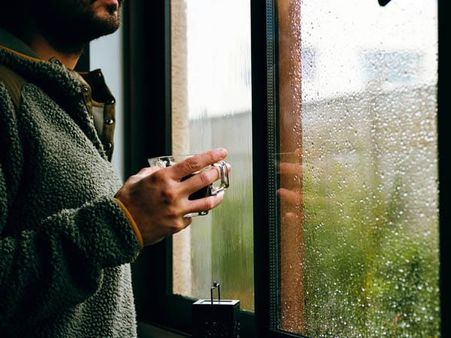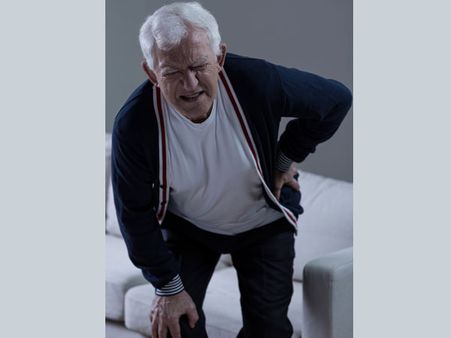Just In
- 12 min ago

- 4 hrs ago

- 7 hrs ago

- 9 hrs ago

Don't Miss
- Education
 MPPGCL JE Recruitment 2024; Application process, Selection details and more
MPPGCL JE Recruitment 2024; Application process, Selection details and more - Sports
 Murali Sreeshankar Pulls Out Of Paris 2024: Indian Long Jumper's Olympic Dream Comes Crashing Due To Injury
Murali Sreeshankar Pulls Out Of Paris 2024: Indian Long Jumper's Olympic Dream Comes Crashing Due To Injury - News
 Lok Sabha Election Prediction For Telangana: Will Guarantees Help Congress To Win More Seats?
Lok Sabha Election Prediction For Telangana: Will Guarantees Help Congress To Win More Seats? - Finance
 HDFC Life Q4 Results: PAT Soars 15% To Rs 411 Cr; Rs 2/Share Dividend Declared
HDFC Life Q4 Results: PAT Soars 15% To Rs 411 Cr; Rs 2/Share Dividend Declared - Movies
 Bade Miyan Chote Miyan Box Office Collection Week 1: Fighter Stands 190% Higher Than Akshay’s Film In 7 Days
Bade Miyan Chote Miyan Box Office Collection Week 1: Fighter Stands 190% Higher Than Akshay’s Film In 7 Days - Technology
 Apple’s iPhone 17 Plus Could Sport a Smaller Display Compared to iPhone 15 Plus
Apple’s iPhone 17 Plus Could Sport a Smaller Display Compared to iPhone 15 Plus - Travel
Telangana's Waterfall: A Serene Escape Into Nature's Marvels
- Automobiles
 The Rezvani Retro RR1 Is A Modified Porsche 911 Done Right
The Rezvani Retro RR1 Is A Modified Porsche 911 Done Right
Is COVID-19 Lockdown Increasing Suicide Mortality? A Study Based Approach
COVID-19 lockdown has affected the livelihood of many people worldwide. A study published on 3 April in a journal named JAMA Psychiatry says that in addition to the COVID-19 deaths due to infection or illness, people are also dying of suicides due to the fear of infection, lack of freedom, loneliness, exhaustion, hunger, lack of livelihood and denial of medical care.

The lockdown has mainly affected the lower-class people of the society that includes labourers, farmers and daily wagers. The sudden implementation of lockdown and its extension have made them deprived of many livelihood resources like food, forcing them to take their own lives. Not only the poor, but people from every social class have been affected. Take a look at a few reasons responsible for the increase in suicide mortality amid COVID-19 lockdown.


1. Economic Stress
Closed businesses, cancelled public events, a decline in public consumption and lockdown of export-import services is some of the primary reasons for economic stress leading to recession. A lot of businesses are facing adversity in the functioning, and thus laying off employees or cutting down their salaries. Also, the drop in the stock market has resulted in a decline of retirement funds or other funds leading to high suicide rates during the period. [1]

2. Decrease Of Religious Support
According to a study published in the journal Suicide Life Threat behaviour, people who are involved in religious activities have lower risks of suicide compared to people who are not. A hypothesis also says that belief in one's religion provides protection against suicidal behaviour and attempt due to relation with social support. [2]

3. Social Isolation
Social isolation or distancing has introduced a lot of anxiety in people across the world. People with existing mental conditions like depression and older adults are more vulnerable to suicides or suicidal thoughts. The lockdown has disrupted the normal social lives of people and introduced psychological fear in them followed by the fear of being trapped. Also, the continuous update of death rates due to COVID-19 on social media platforms are worsening mental stress in people, forcing them to take a step towards suicide. [3] A study states a case description of two people who have started self-harming behaviours without any history of mental illness. [4]

4. Restrictions To Healthcare
With an increase in COVID-19 infected and death rates, overcrowding of patients at hospitals have increased at a faster rate with no or minimal place for patients with other disorders. Many appointments and regular therapies have been cancelled due to limitations on mobility or the diversion of medical experts towards COVID-19 patients. Reduced access to mental healthcare has become a barrier in their treatment, leading to a negative effect on patients and an increase in suicidal ideation. [5]

5. Medical Conditions
The WHO has published it before that elders and people with existing medical conditions are more prone to COVID-19 infection. This has increased the fear and anxiety in people with positive COVID-19 who are also suffering from a certain medical condition. Those people have got into the dilemma that COVID-19 will complicate their health more and will cause them to die soon. The thought of hopelessness and considering oneself worthless have led to the onset of depressive symptoms, introducing suicidal thoughts in many. [4]

How To Prevent
- Practice physical distancing, not social distancing.
- Increased access to mental healthcare or the introduction of other ways to provide medical experts to needed patients.
- Remote-based suicide prevention methods like telephone, mail and follow up on required patients.
- 24/7 hotline for reporting mental conditions followed by steps taken to provide people with their needed help.
- A shared platform where people with similar conditions can share their experience. It will help others understand and support one another.
-
 disorders cureIndia May See A Covid Surge In January, Next 40 Days Crucial; Here Is How To Protect Yourself From COVID-19
disorders cureIndia May See A Covid Surge In January, Next 40 Days Crucial; Here Is How To Protect Yourself From COVID-19 -
 disorders cureCOVID Can Trigger Parkinson's Disease: Study
disorders cureCOVID Can Trigger Parkinson's Disease: Study -
 disorders cureCommon COVID Symptoms In Fully Vaccinated Individuals: What You Should Know
disorders cureCommon COVID Symptoms In Fully Vaccinated Individuals: What You Should Know -
 wellnessMild COVID Linked To Life-Threatening Blood Clots, Increased Risk Of Cardiovascular Disease; Study
wellnessMild COVID Linked To Life-Threatening Blood Clots, Increased Risk Of Cardiovascular Disease; Study -
 wellnessCOVID-19 Variants In India: New COVID Variant May Pose Threat To Elderly People
wellnessCOVID-19 Variants In India: New COVID Variant May Pose Threat To Elderly People -
 basicsCovid-19 Linked To Early Onset Of Periods: What You Need To Know
basicsCovid-19 Linked To Early Onset Of Periods: What You Need To Know -
 wellnessCOVID XBB Variants Of Omicron In India: What You Should Know
wellnessCOVID XBB Variants Of Omicron In India: What You Should Know -
 disorders cureNew Omicron Subvariant BQ.1 Detected In Maharashtra: What You Should Know
disorders cureNew Omicron Subvariant BQ.1 Detected In Maharashtra: What You Should Know -
 disorders cureOmicron BF.7 In India, Risk Of Fresh Wave During Diwali: What You Should Know
disorders cureOmicron BF.7 In India, Risk Of Fresh Wave During Diwali: What You Should Know -
 womenPriyanka Chopra Speaks On Climate Change, COVID, Poverty At The UN Sustainable Development Goals 2022 Moment
womenPriyanka Chopra Speaks On Climate Change, COVID, Poverty At The UN Sustainable Development Goals 2022 Moment -
 wellnessCoronavirus Residues Might Be Causing Long COVID: New Study
wellnessCoronavirus Residues Might Be Causing Long COVID: New Study -
 art cultureRenowned Spanish Author Javier Marias Passes Away Due To Lung Infection Post COVID-19
art cultureRenowned Spanish Author Javier Marias Passes Away Due To Lung Infection Post COVID-19


 Click it and Unblock the Notifications
Click it and Unblock the Notifications




